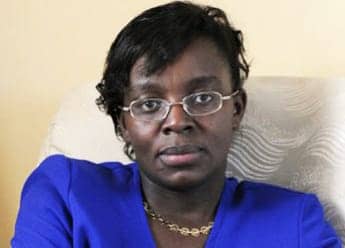Rwandan presidential candidate Victoire Ingabiré Umuhoza, arrested April 21st, held at Kicukiro Police station.
The Rwandan FDU-Inking Party's announced that their presidential candidate, Victoire Ingabiré Umuhoza, was arrested on the morning of April 21st, and taken to Rwanda's Kicukiro Police station. They have called upon the international community to come to the aid of Mrs. Ingabiré and peaceloving Rwandan people:
SUPPORT COMMITTEE
CONTACT: EUGENE NDAHAYO TEL. 00 33 676758434
Brussels, 21st April 2010
Mrs. Victoire Ingabire Umuhoza: icon of the struggle for freedom, democracy and justice in Rwanda arrested
UDF-Inkingi Support Committee demands her immediate and unconditional release.
The UDF – Inkingi Support Committee condemns in the strongest terms possible the arrest this morning of the party Chair, Mrs. Victoire Ingabire Umuhoza, for her views on how to bring about genuine national reconciliation and peace through the rule of law and equal opportunity and how to end the cycle of political violence through a non violent, peaceful democratic competition for and exercise of power. We know that this violent arrest will not deter her determination, instead its prompts the struggle of this freedom icon to a higher level.
It is a tragedy for Rwanda that a call for justice for all Rwandans irrespective of political and ethnic affiliation and for an all inclusive national dialogue to give their views on how to put in place institutions that reassure every Rwandans is turned into accusations of: genocide ideology, divisionism and collaboration with a terrorist organisation FDLR.
Such a barbaric and unlawful act against a peace loving mother who braved the system to show that there is another way to bring about lasting peace and development in Rwanda is not only a challenge to the conscience and dignity of the Rwandan people but also to the international community, in particular foreign governments who are sponsoring the government.
It is an irony and a challenge to the international community that this is happening at a time when the Governor General of Canada, a lady herself and whose government was not only at the forefront of countries that sponsored Rwanda to join the commonwealth on the grounds that it meets democratic standards and other values of that organisation, is visiting the country. During the visit she is scheduled to meet the women and men of Kibirizi and participate in a discussion on the growing participation of women in Rwandan society.
We call upon governments and peace loving people and organisations to support us in getting our chair immediately and unconditionally released.
For the UDF INKINGI Support Committee Eugene Ndahayo, President.
This report has also been posted to Victoire Ingabiré Umuhoza's blog,
http://victoire2010.skyrock.com/.



















